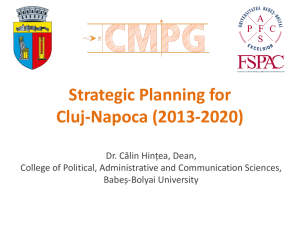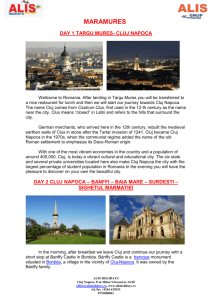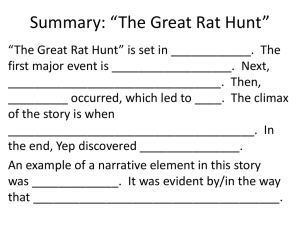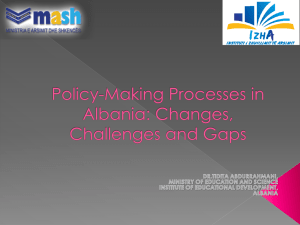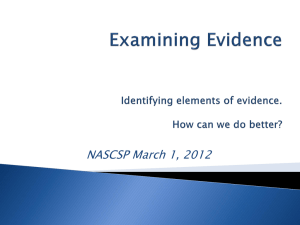Strategy Presentation Cluj July 19 ARaulea High Level Meeting
advertisement
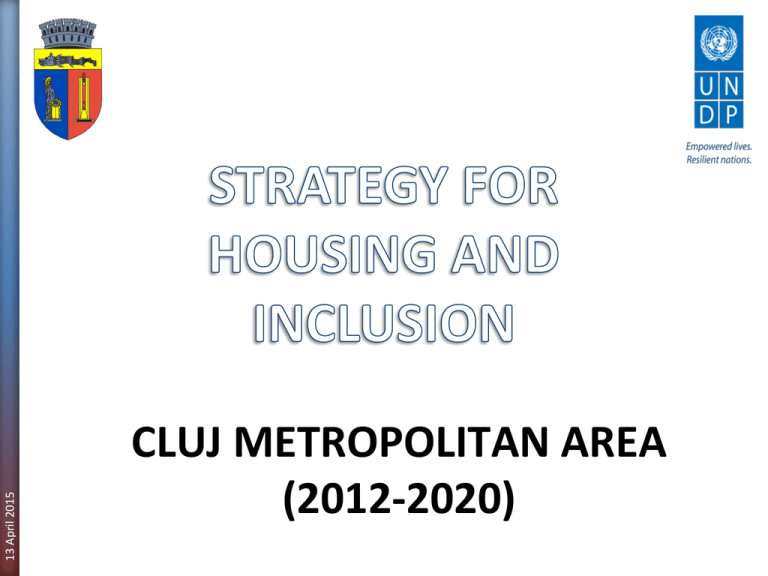
13 April 2015 CLUJ METROPOLITAN AREA (2012-2020) 13 April 2015 Metropolitan Area Cluj 13 April 2015 Cluj Napoca Pata Rat in Cluj – Build up “Colina Verde” – New Pata-Rât • 13 April 2015 • • • • Families relocated from Coastei street (central street of Cluj) in December 2010. Substandard social housing in modular dwellings, overcrowded and segregated at the periphery of the city. Total inhabitants: 243 persons Children below school age: 37 School age children: 72 Active-age population (18-64): 140 persons, out of whom 22 were formally employed at the time of relocation. The majority of men have work experience in construction and manual labor, whereas women work in semiskilled routine service jobs, mostly without a contract. Before relocation, they were relatively well integrated, and all children were in school. Except from four families, all of them are ethnic Roma. Pata Rat in Cluj – Build up Cantonului street • • • • • 13 April 2015 • Barracks near an old railway station and on the unused railway lines, donated by charity organizations (Ecce Homo and Pro Roma) to the families evicted from the city after 2000. The families are sued by the National Railway Company for abusive occupation of the land and face the threat of eviction. Total inhabitants: 451 persons Children below school age: 101 School age children: 103, but one-third not attending school. Half of those attending education are in “special schools” for children with disabilities. Active-age population (18-64): 234 persons, out of whom 65 have some formal work experience and 49 are currently employed, mostly in cleaning services. The majority completed only primary education or gymnasium, but 20 persons have vocational secondary education or high school. Almost one-fifth of the inhabitants do not hold valid identity papers. The settlement is ethnically mixed: cca 60% are Roma, 30% Romanians and 10% Hungarians. Pata Rat in Cluj – Build up “DALLAS” – OLD PATA-RÂT • • • • 13 April 2015 • The agglomeration of improvised houses and barracks known as “Dallas” colony. Two international NGOs active there: Pro Roma Foundation and the Association Ajutorul Familiilor. Total inhabitants: 271 persons Children below school age: 83 School age children: 58, but half of them not attending school Active-age population (18-64): 130 persons, but only 16 have some formal work experience and two are currently employed. They make a living mostly from recycling waste from the nearby garbage dump. The very majority completed only primary education or gymnasium. At least one-fourth do not hold valid identity papers. Around 85% of the inhabitants declared to be ethnic Roma. Pata Rat in Cluj – Build up GARBAGE DUMP • • • • 13 April 2015 • At the very end of Pata-Rât street, right near the garbage dump of the city (“ramp de guano”). Some of them seasonal “workers” coming from other regions, earning a living from recycling waste at the dump. Total inhabitants: 109 persons Children below school age: 37 School age children: 26, but none of them attending school Active-age population (18-64): 46 persons, out of them 18 have some formal work experience and two are currently employed. They make a living mostly from recycling waste. The very majority completed only primary education or gymnasium. At least one-fourth of the inhabitants do not hold valid identity papers. 90% declared to be ethnic Roma. 13 April 2015 Claudiu Cosier, NW-RDA, 19 December 2011 INTEGRATED HOUSING AND INCLUSION STRATEGY CLUJ NAPOCA METROPOLITAN AREA (2012-2020) Short term interventions (2012 2015) – Project package financeable in this programmatic period 13 April 2015 – Emergency Interventions Long term development (2011-2020) Implementing a long-term strategy for complex solutions to the problems of exclusion of vulnerable citizens, including Roma, in an integrated and sustainable way in Cluj Metropolitan Area, which addresses housing needs as part of an integrated approach including education, health, social affairs, employment, security and desegregation measures and ensures equal opportunities for all in all policy areas regardless of social status, ethnicity and gender. Social Inclusion Strategy for the Cluj Metropolitan Area (Objectives) 13 April 2015 Social innovation in terms of empowerment of the citizens at risk of exclusion to participate in the planned housing program and ensuring their ability to sustain the results. Social Inclusion Strategy for the Cluj Metropolitan Area (Objectives) 13 April 2015 Improving inclusion oriented public and communities services and integrating them with the social housing program Social Inclusion Strategy for the Cluj Metropolitan Area (Objectives) 13 April 2015 Set-up and realize a social housing system and program in CMA with participation of the target group and social enterprises in planning and implementation of the housing program. Social Inclusion Strategy for the Cluj Metropolitan Area (Objectives) 13 April 2015 Integrate the social housing programme with the Economic Development Plan of the CMA focused on employment opportunities and job creation for the target group. 13 April 2015 Social Inclusion Strategy for the Cluj Metropolitan Area (Objectives) Provide model to other similar initiatives in Romania and other countries in Central and Eastern Europe and join the Cluj programme’s development network to other, existing area-based networks across national borders Methodological principle 13 April 2015 •Participation. Real progress takes place only when the ‘target group’ is actively involved in local development. This project is aimed to invest in the local stakeholders not simply by providing fund and expertise, but also by expanding people’s knowledge, skills and ownership of the process. Methodological principle 13 April 2015 •Participation. •Motivation and commitment. In order to ensure local participation of the poor, disadvantaged people need to feel motivated and committed to the goals of development and self-confidence to contribute to the implementation of them. To spur motivation and participation in the project it is needed to use external coaches. Two Coaches will work with the communities of the Pata Rât during the whole project period and continue after for minimum two years. Methodological principle 13 April 2015 •Participation. •Motivation and commitment. •Everyone’s development. Local development must be inclusive. It is for everyone in a community, and should involve everyone, including the most vulnerable. Everyone can have ideas, everyone can contribute. The mission is to create the capacity of locals to transform their perceived needs into projects. Experts should not tell people how to live, or what to do. Learning is an interaction among equals. Methodological principle 13 April 2015 •Participation. •Motivation and commitment. •Everyone’s development. •Strengthening communication. In order to be effective, people need to convey development knowledge to others who need it. For this purpose, the project will establish a Resource Centre for Integrated Housing and Inclusion that serves as an information and coordination hub for communicating ‘best practices’ to other parts of the country and the region. Methodological principle 13 April 2015 •Participation. •Motivation and commitment. •Everyone’s development. •Strengthening communication. •Social organization. Each community will function better if it is well organized. The level of social organization is related to the life quality and the economic potential of communities too. Methodological principle 13 April 2015 •Participation. •Motivation and commitment. •Everyone’s development. •Strengthening communication. •Social organization. •Complexity. The Project offers a broad conceptual model which addresses some of the complexities faced by those involved in development. These complexities lie in the variety of local needs, the multiplicity of people and organizations, the complex pattern of public bodies and the fact that areabased development is both topdown and bottom-up in character, calling upon the resources of government and the energy of the people. Methodological principle 13 April 2015 •Participation. •Motivation and commitment. •Everyone’s development. •Strengthening communication. •Social organization. •Complexity. •Area-based approach. Cluj Pole City, as the target area, is considered in the project as a social and economic whole, comprising people, nature and other resources and know-how. Methodological principle 13 April 2015 •Participation. •Motivation and commitment. •Everyone’s development. •Strengthening communication. •Social organization. •Complexity. •Area-based approach. •Integrated development. That means to find a way to harness the resources and energies of relevant bodies to coherent and coordinated development actions and process. Methodological principle 13 April 2015 •Participation. •Motivation and commitment. •Everyone’s development. •Strengthening communication. •Social organization. •Complexity. •Area-based approach. •Integrated development. •Social Cohesion Which can be built up through implementation of the previous principles Methodological principle 13 April 2015 •Participation. •Motivation and commitment. •Everyone’s development. •Strengthening communication. •Social organization. •Complexity. •Area-based approach. •Integrated development. •Social Cohesion •Desegregation The planning and strategic hierarchy • PIDU (Urban Development Plan of the Growth Pole) • PUG (Urban Plan) • Cluj-Napoca Development Strategy • National Roma Inclusion Strategy 13 April 2015 – Cluj Roma Inclusion Strategy (to be prepared) • National Poverty Reduction Strategy The institutional hierarchy • Municipality of Cluj Napoca • Growth Pole 13 April 2015 – NW-RDA – Development Association of Metropolitan Municipalities • Cluj County Council • Line Ministries, Lead Ministries • Operational Programs 13 April 2015 Preparatory Phase: 2012 OSI – UNDP Project • Community level interventions in Pata Rat • Participatory assessment • Mapped and re-organized development resources at CMA level • Partnership development • Project package (short term intervention) • Inclusion Strategy Concept note • Multi-level networking OSI – Making the most of EU Funds for Roma Initiative UNDP Regional Roma Inclusion Program Partners: • Municipality of Cluj Napoca (Lead); • NW Regional Development Agency; • Babes Bolyai University Advisory/Watchdog: gLOC Budget: USD 60.000 Capacity Development needs 13 April 2015 - Community coaching process has started in frame of the UNDP-OSI project - Metropolitan Inclusion Centre has to be set-up (management) - Re-organize public services and social housing regulation; - Create enabling environment for social enterprises Short term interventions (2012 -2015) Linking the present with the future 13 April 2015 INTEGRATED FLAGSHIP PROJECT FOR INCLUSION 13 April 2015 Elements of the flagship project package to be financed - Flats built/reconstructed with participation of the newly trained professionals with contribution of the families who got new flats in the houses (40% people from Pata Rat); Ensure low cost maintenance of the buildings (energy efficiency + renewable energy) - Business Incubator (SME + Social enterprise) established to create long-term job opportunity to people whose skills and knowledge have been increased by different vocational (waste recycling; management of the city’s green areas & produce renewable energy from the green waste - Metropolitan Inclusion Centre and Community Buildings providing different public services for inclusion Housing & desegregation Metropolitan Inclusion Center CLLD 13 April 2015 Integrated approach Multifunctional Community Center & Social Services Sustainable results Business Incubation & Job creation Short term intervention “Checklist” Housing Job Security / Creation Multifaceted social services able and ready to move out from Pata Rat who need a sustainable income source in order to move out with disabled family members who want to stay in Pata Rat after the garbage dump closure 13 April 2015 Interest group of people (in Pata Rat) who have properties outside of Pata Rat who have no plans or idea about their the future who wants to move to another dump
